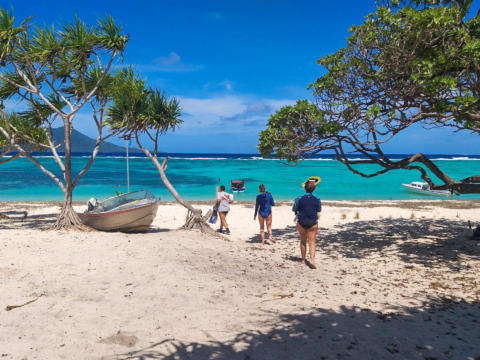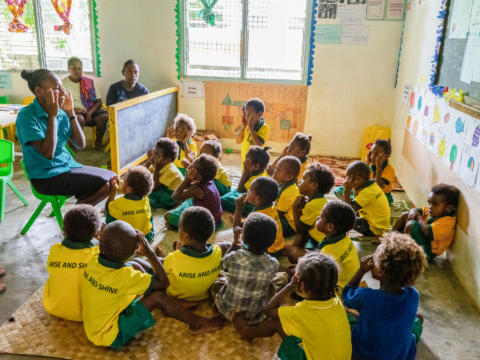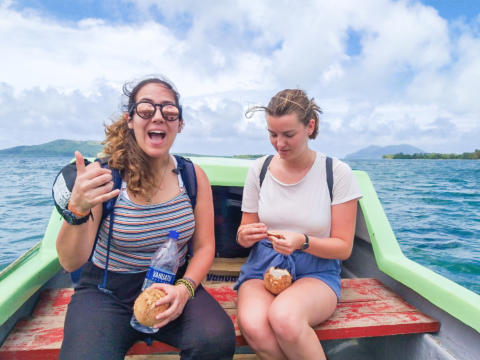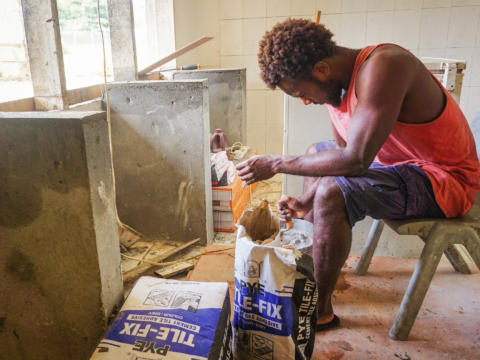Only 480€ per week!
Culture Week
Port Vila - Vanuatu
Culture Week
Port Vila - Vanuatu
Immerse in the local culture of Vanuatu by exploring many exciting locations, and spending your time learning about the unique traditions.
Vanuatu provides you with the first-hand experience of what the ancient Melanesian culture of the South Pacific islands has always been about – and what it still stands for even in our fast-changing world of the 21st century.
Program Description
Culture Week is organized for you to prepare yourself better for the coming weeks where you will be more engaged with the local communities. Your program will be spent in Port Vila where you will learn about the culture of Vanuatu. Go on a city tour and visit a few interesting locations where you will learn more about Vanuatu. You will also learn the local language and get the experience of cooking a typical Melanesian meal. You will enjoy a one day picnic to the Blue lagoon. Friday is for you to explore the surroundings and visit your projects for the following weeks.
Aims & Objectives
To expose you to the real culture of Vanuatu and make you prepare for the upcoming projects and the ways of living in the country.
Schedule
Monday
- Welcome and introduction to the program and collection of important documents
- City tour of Port Vila
Tuesday
- Learn the basics of Bislama in the language class and weaving class
- Mele cascades waterfall
Wednesday
- Learn to cook traditional Melanesian dishes
- Learn Ni-Vanuatu Culture in Secret garden
Thursday
- One day trip picnic at Blue Lagoon.
Friday
- Visit to the placement of your choice
- Prepare for first placement activities
Note: This schedule can be changed and/or amended depending on weather conditions, local conditions and unforeseen circumstances.
Participant Criteria & Requirements
Standard Requirements
Minimum age: –
Maximum age: –
Minimum English level: Basic
CRB required: On Signup
Passport copy required: On Signup
Resume copy required: No
Required qualification: None
Additional Requirements
Participants below 18 require parental consent and participants above 65 require medical clearance to take part in this program.
Additional Equipment
- Clothes that cover your knees and shoulders to visit religious sites and schools.
Location
Port Vila is the harborside capital and main hub of Vanuatu, on Efate island. Its small downtown is home to colourful market stalls selling produce and local handicrafts. The National Museum of Vanuatu Cultural Centre, displays artefacts such as slit gong drums and outrigger canoes. The town is a base for diving and trips to Mele Cascades, a multi-tiered waterfall with rock pools in a rainforest.
About the Accommodation
Your accommodation is a beautiful villa located very close to the beach. Your program fee covers your accommodation from the Sunday before your start date and your check out is on the last Saturday of your program at 12 noon.
Food Arrangements
You will be served with authentic cuisine which consists mainly of Chicken dishes, and dishes such as cheese curry served in coconut milk. Coconut curry, dhal (lentils), fish curry, saffron rice, fresh tropical fruits, and ladob is eaten either as a savory dish or as a dessert.
Facilities
ATMs: There are ATM's around our centers. The closest one to our residence is about a 15 minute walk from the house.
Shop: The closest local supermarket is a 10 minute walk from the centre.
Activities & Events
No scheduled activities outside the program.
Sights & Surroundings
There are many sights and surroundings which you can explore during your time in Vanuatu.
Transportation
From this location we do not provide free transport to other locations.
Quick Facts
Name: The Republic of Vanuatu
Population: approx. 286,429
Capital: Port Vila
Language: Bislama
Currency: Vanuatu Vatu (VUV)
Time zone: VUT (UTC +11)
Country Information
Vanuatu consists of 83 islands located about 800 kms west of Fiji and 2,250kms northeast of Sydney. Until the explorers and missionaries arrived around the 15th century, Vanuatu had been home to Melanesians for over 3,500 years. It now has a Westminster parliamentary style of democracy since its independence on 30th July 1980, after more than 70 years of rule by Great Britain and France. Its original name given by Capt James Cook in 1774 was New Hebrides and the legal system is based on British law. The population is 95% indigenous “Ni-Vanuatu” of Melanesian descent.
Vanuatu for many years already has been a financial centre, without any personal or corporate taxes nor any tax treaties with foreign countries. On all goods and services a Value Added Tax (VAT) is charged at 12.5%.There are exports of copra, manganese, hardwood and beef, whilst Tanna Island is famous for its excellent coffee grown there.
Climate
Vanuatu has a tropical climate in most areas with subtropical conditions at some of the most
southern islands.Average temperatures range from 25°C in winter to 29°C in summer; please note the seasons are directly opposite to those in the Northern hemisphere, and Dec – March is also the cyclone season with hot and rainy conditions throughout.
Culture
The culture of Vanuatu has been mainly influenced due to colonization by the British and the French. Even though the national language of Vanuatu is Bislama, due to the impact of colonization both English and French languages are also considered as official languages.
In terms of religion, Christianity is still the major religion in Vanuatu and the majority of the Christians adhere to the Presbyterian church in Vanuatu. The culture of Vanuatu is also diverse across different regions and particularly in the central region, Melanesian values also dominate.
Transportation
By Plane
There are international scheduled flights between Port Vila and Fiji, Australia, New Zealand, Papua New Guinea, New Caledonia and the Solomon Islands.
Domestic flights also from the Bauerfield Airport are between Vila and the main islands including Espiritu Santo, Tanna, Pentecost, Malekula and Ambrym.
By Bus
Unfortunately there is no regular public transport system in Vanuatu. Instead there are many mini buses (usually pick-up trucks or vans) especially in Port Vila and Luganville. They are privately owned and can be identified by a red letter "B" which is attached to the number plates. As there are no fixed routes they are simply flagged down on the side of the road, and the driver will determine whether or not your destination is on his route. First passengers are dropped off first. Especially on the other islands you may need to check at the market sites and make arrangements with available trucks marked with a red “T”.
By Taxi
Should you plan day trips, taxis may be a more convenient alternative, though less economical than buses. Always make sure to negotiate the price prior to the journey. This applies mostly to Port Vila where the tourists from large cruise ships will want to see and do things within their few hours of time on land.
By Boat
Inter-island transportation and cargo movement relies heavily on ferry vessels of different types and sizes. The conditions of most vessels are not of international standard in terms of accommodation and safety.





